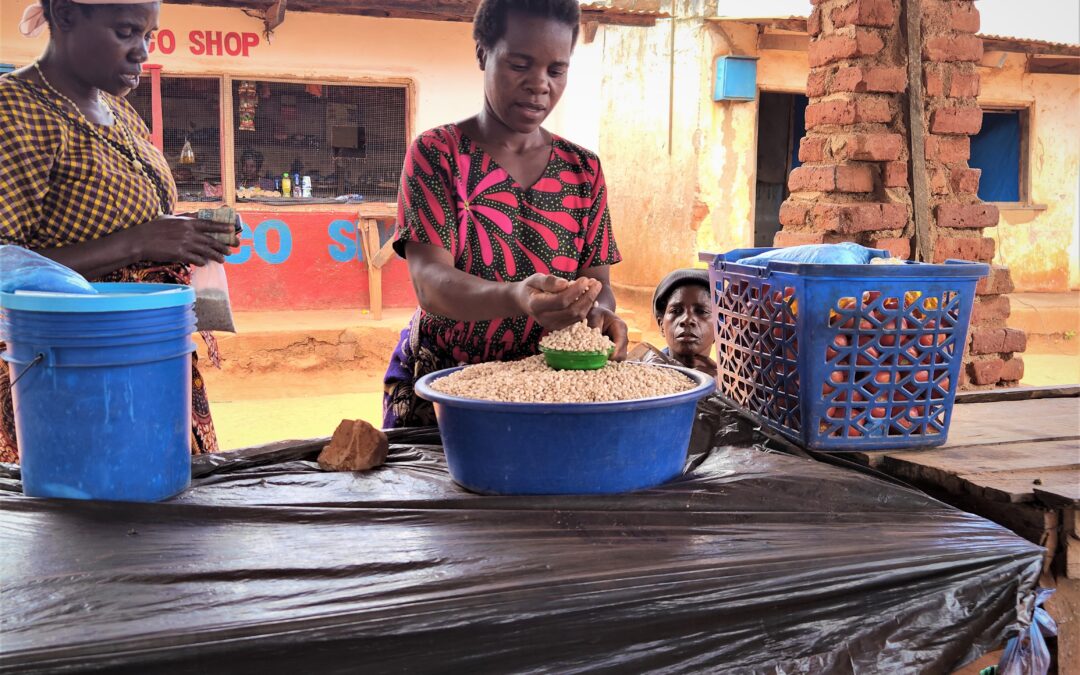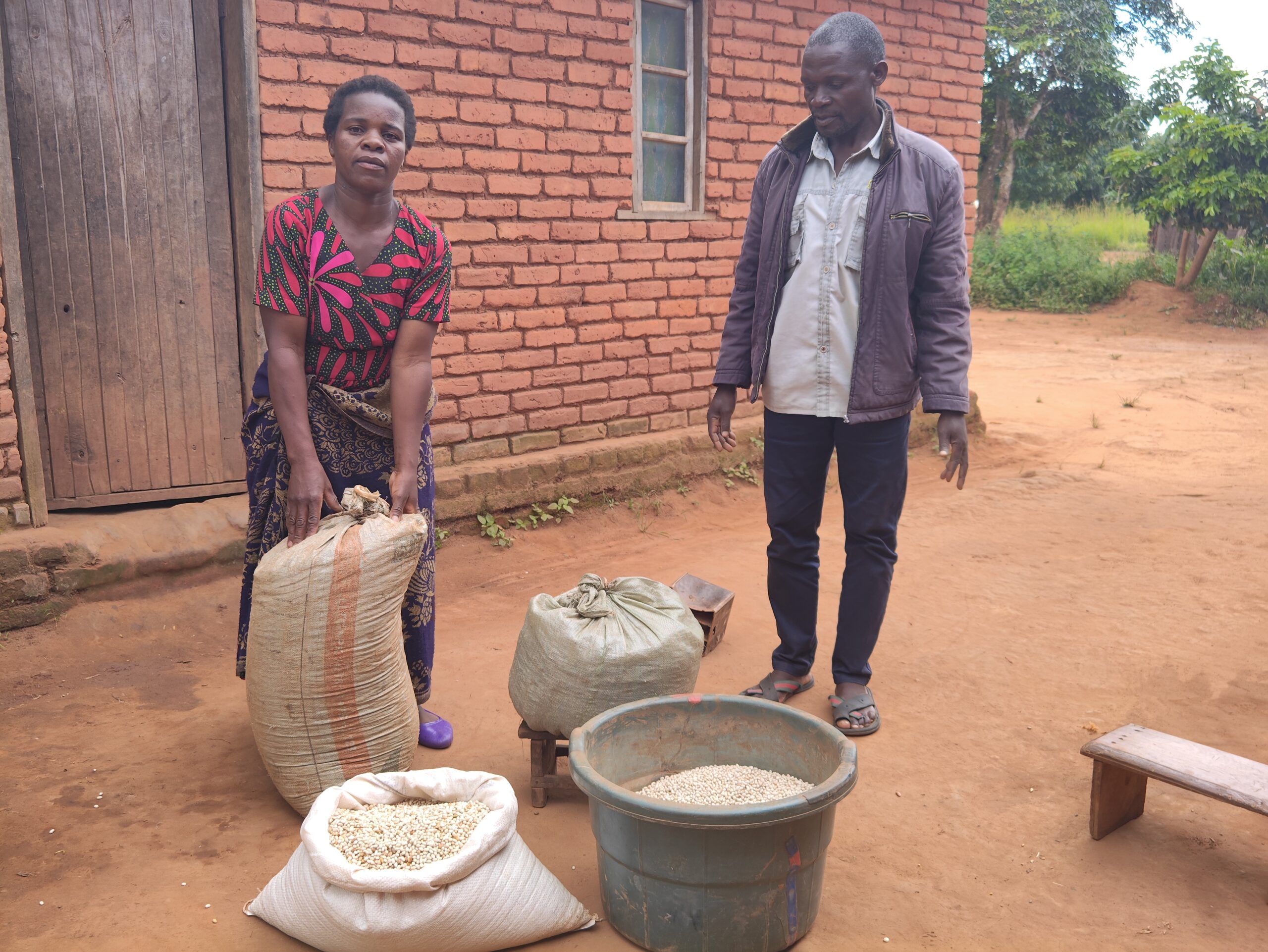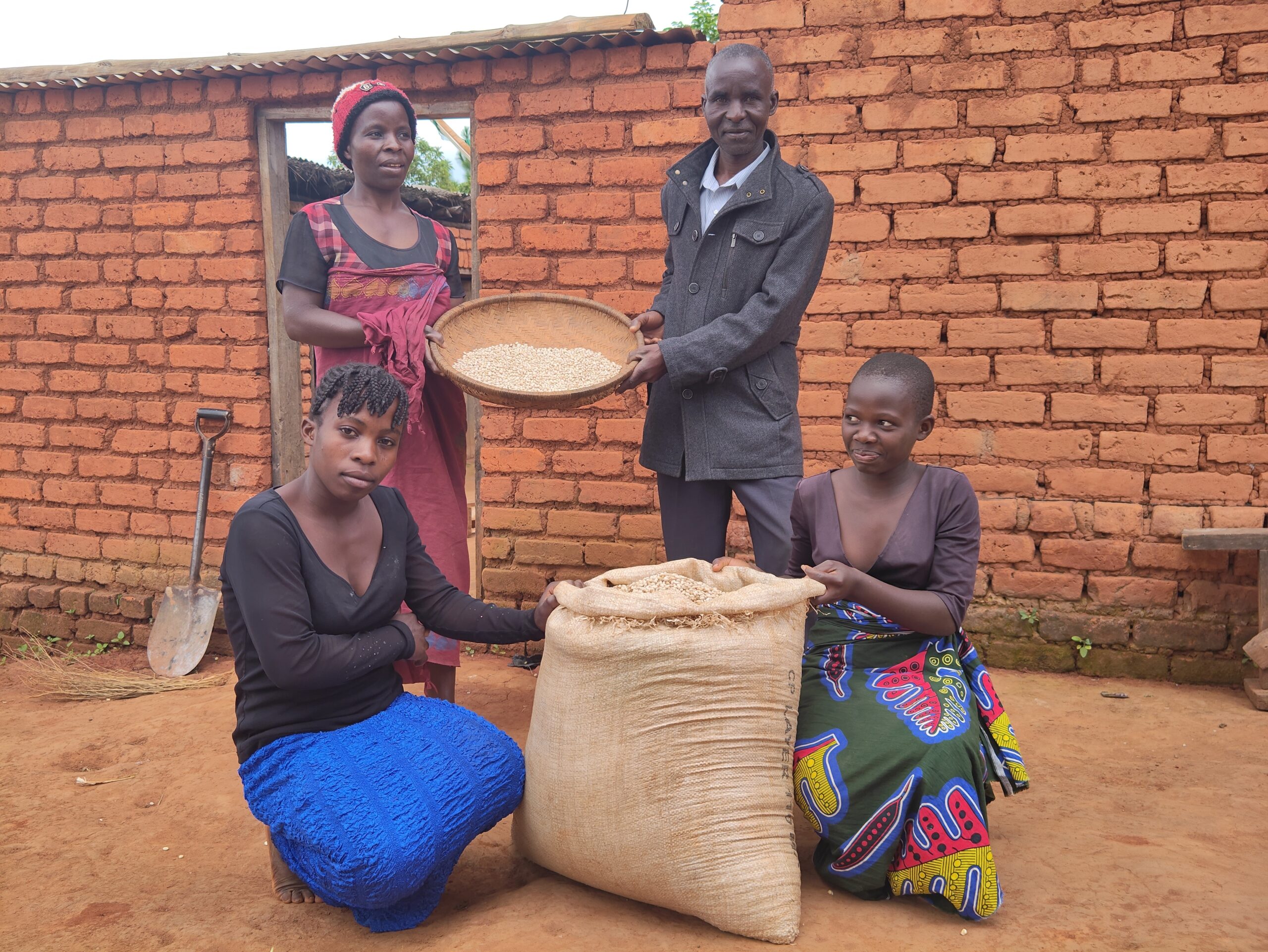Lydia Chirwa (right )from Mzimba District,Malawi selling beans to a customer. Photo – Yohane Chideya
By Yohane Chideya, Jefferson Munyao & Wilson Nkhata
Lydia Chirwa from Mapira Village from Malawi in Khonsolo, Mzimba district is an ardent common bean farmer, who, unfortunately, never registered satisfactory yields ever since. Her efforts in bean farming had always been hampered by recycling bean seeds.
With the intervention of the Pan-Africa Bean Research Alliance, Chirwa has been able to access certified seed and now can breathe her sigh of relief. During our visit, we find her hard at work negotiating with a customer who had come to her homestead to buy beans
In February 2023 she cultivated 25 kilograms of haricot canning beans and harvested over 500 kilograms. She attributes the bumper harvest to good farming practices, albeit the 2022-2023 farming season rated as one of the worst for most farmers due to heavy rains triggered by Tropical Cyclone Freddy. But still, Chirwa is happy as she eyes making about K40,000,000 (approximately $380) after selling her produce.
“The economic status of my family is going to improve tremendously. Cultivating certified bean seeds has been improving our yields. Even in harsh climatic conditions, I can now access certified seeds that mature faster and are high yielding, ever since my fortunes from bean farming have been increasing tremendously.” she says.
Chirwa showing some of the beans she harvested – photo Yohane Chideya
Another farmer Clement Phiri from the same area concurs with Chirwa. Clement says he has renewed hope in bean farming more than ever before. The father of five planted 30 kilograms of the same haricot canning bean and managed to harvest 550 kilograms.
“For our colleagues who went for other crops, they ended up harvesting nothing tangible, following prolonged days of rain. But for us who went for beans, we have benefited a lot. We are ready to cultivate more improved bean varieties such as NUA 45 for us to improve our livelihoods,” explains Phiri.
Phiri with his family showing some of the beans they harvested – photo by Yohane Chideya
Chirwa and Phiri are among the farmers that have benefited from projects implemented by the Alliance of Bioversity International and the International Centre for Tropical Agriculture, aimed at solving problems affecting the common bean value chain in southern Africa from production to consumption.
They have been implemented with $1.5 million funding from Michigan State University’s Feed the Future Innovation Lab for Legume Systems Research, which has managed to bring together researchers, scientists, scholars, and public and private sector officials, to bang heads on how they can improve the bean value chain.
Local seed multipliers, companies, and traders have also been part of the platform, and together with research institutions have assisted in providing various certified bean seeds to farmers for cultivation.
One of the traders is Afriseed, whose Executive Director Grace Mhango Mijiga, feels the collaboration has increased the availability of clean materials, which will be crucial for bean farming in Malawi for decades to come.
Mijiga who is also the Grain Traders Association of Malawi President, adds that the intervention by different players is revolutionizing and improving the country’s bean value chain, by ending farmers’ overreliance on recycled seeds.
“We are also able to get crucial market information that is enabling us to know what varieties to grow depending on market demands. Today, I have enough basic seeds of NUA 45 beans that can be cultivated on 825 hectares of land and produce over 1,200 tons. There is a market for this variety,” she says.
Blantyre-based Entrepreneur Mwaiwawo Kukada has started processing beans into flour and plans are underway to contemplate making noodles and different flavored flakes from the legume.
“We are already in the process of making chocolate and vanilla-flavored flakes from beans for people to consume based on their preferences. For the noodles, the idea is that in terms of nutrition, it should benefit a lot of children in schools,” explains Kukada.
Smith Nkhata is a Lecturer specializing in nutritional sciences, food and health, agro-food processing, and value addition at the Lilongwe University of Agriculture and Natural Resources (LUANAR).
He says despite the capacity of Small and Medium Enterprises, they have the potential of making it big in the food processing sector in Malawi, arguing that there is a need to address the supply chain by making beans easily accessible.
“The formula is simple. Let us make beans readily available and cheaper to make agro-food processing easy for local entrepreneurs. The processors on the other hand should be driven by customer preferences,” says Nkhata.
Nkhata adds that if more entrepreneurs can come forth and dedicate themselves to pre-cooked beans, for instance, it can assist in saving the environment as it will reduce the long hours that most people endure when preparing beans for consumption using firewood.
Bean Programme Leader and Director for Pan Africa Bean Research Alliance (PABRA), Jean Claude Rubyogo, is certain bean farming can be a catalyst for job creation through various business opportunities in Malawi and Africa.
“An investment in the improvement of the common bean value chain is important because beans are at the center of nutrition and food security for millions of people globally. Today we are glad that there are quite a few agro-food processors in Malawi that is why we are very much sure that we are on the right path,” says Rubyogo.
It is projected that by 2050, the world population will be hovering around 10 billion, with demand for food, land for settlement, and other amenities likely to be under pressure.
For this reason, Barry Pittendrigh, who is Head of Michigan State University’s Innovation Lab for Legume Systems Research, feels an increase in food production today to meet the growing demand is key and beans have proven to be crucial in this endeavor.
“We would like to see Malawi achieve developmental agendas like the Malawi 2063 vision and UN Sustainable Development Goal number 2 easily, where it is explicit that improved agricultural productivity can transform the agricultural sector by generating income, reducing poverty and hunger,” says Pittendrigh.
Principal Secretary in the Ministry of Agriculture, Dixie Kampani, is therefore optimistic that the use of high-quality seeds climate-smart by farmers is key to increased agricultural production.
“The crop, therefore, has a great potential to contribute to the country’s economy through increased foreign exchange earnings, which, for the past decade, have been declining due to poor tobacco prices.”
Over 80% of Malawi’s population depends on agriculture for their livelihoods. On top of that, more than one-third of Malawi’s Gross Domestic Product (GDP) and 90% of export revenues come from the same.



